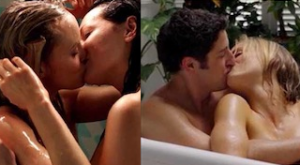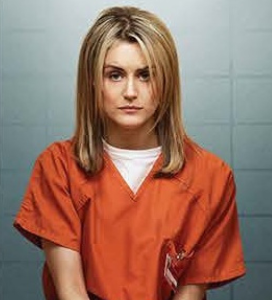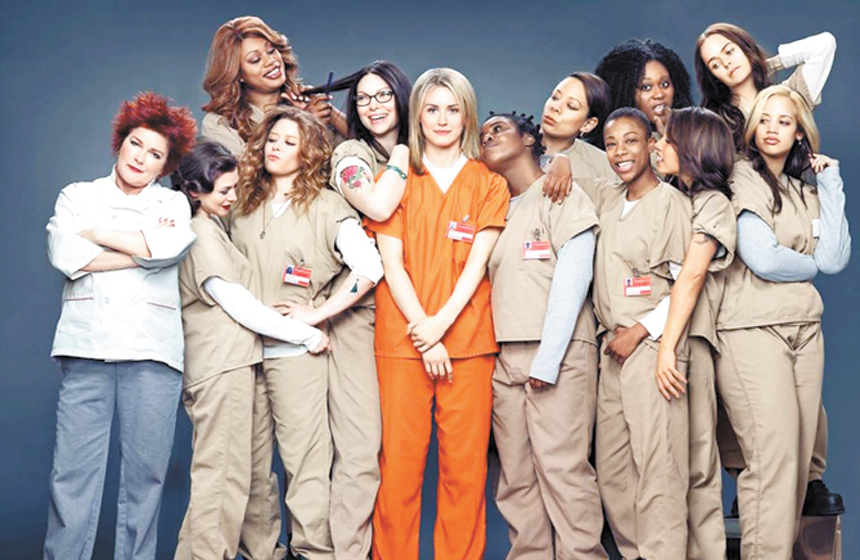Biphobic Themes in ‘Orange is the New Black’
This article contains potential triggers for biphobia. I’d also like to remind people of our website policies regarding comments section, which can be viewed here. Feel free to express your opinion, but bigoted content will be deleted or edited at the admins discretion.
Orange is the New Black is one of the very few shows out there that have a bisexual lead character. The only other two out there that I can think of is Canadian produced Lost Girl and British produced Torchwood. I’m sure there are others because, let’s face it, there’s a lot of shows out there and I haven’t seen all of them, but the point still stands that this is a relatively rare occurrence so it’s worth celebrating. Even rarer still is the fact that this show is American made. While it’s venue as being an exclusive Netflix release precludes it from being considered as something “on television” I still find it very significant that it’s produced in the United States. However, it’s definitely not without its faults. In fact, throughout the course of the first season the term “bisexual” is never used despite the fact that that’s very clearly what the lead character, Piper Chapman, actually is. In fact, characters repeatedly refer to her as a “lesbian,” a “former lesbian,” or a “straight girl.” The use of all of these terms cuts deeply for people who have been the victims of biphobia and I wonder if the use of these terms was an accident or if was intentional commentary of what it feels like to be a victim of biphobia. Their intention is very difficult to determine, but there is no doubt that the first season is heavily laced with biphobia.
 The first instance of biphobia comes in the very first episode, which definitely sets up the series for problematic language right out of the gate. Piper sets her family down to inform them that she committed crimes and will be going to prison for it. She smuggled drug money out of the United States for her former girlfriend. Her family seems mostly hung up on the fact that she used to be in a relationship with a woman than concerned about the crimes that she committed. They ask “are you still a lesbian?” She responds with “no, I’m not still a lesbian,” seemingly conceding to the idea that there is only “straight” or “lesbian” options. Later on in this same episode she refers to that period of her life as “a phase,” though whether she’s talking about her criminal act or her sexality isn’t quite clear. Either way, these words don’t sit well to anyone who has encountered biphobia. These are terms used to describe us quite frequently and the fact that she reinforces it is really heartbreaking.
The first instance of biphobia comes in the very first episode, which definitely sets up the series for problematic language right out of the gate. Piper sets her family down to inform them that she committed crimes and will be going to prison for it. She smuggled drug money out of the United States for her former girlfriend. Her family seems mostly hung up on the fact that she used to be in a relationship with a woman than concerned about the crimes that she committed. They ask “are you still a lesbian?” She responds with “no, I’m not still a lesbian,” seemingly conceding to the idea that there is only “straight” or “lesbian” options. Later on in this same episode she refers to that period of her life as “a phase,” though whether she’s talking about her criminal act or her sexality isn’t quite clear. Either way, these words don’t sit well to anyone who has encountered biphobia. These are terms used to describe us quite frequently and the fact that she reinforces it is really heartbreaking.
The context of this scene needs to be taken into consideration, though. She’s dealing with an extremely stressful life event and is having to come clean about her criminal past. Taking a stand in the name of her sexuality might not be something she’s comfortable doing at this point, nor does it seem to be a priority for her in that moment. When the context of that scene is taken into consideration her actions become a bit more understandable, though it is still disappointing on some level. It does allow for room for Piper to grow in the future, though. Once she gets through this horribly stressful period of her life she may have the courage to take a stand and proudly declare that she’s bisexual. This moment is not that time for her, though. She has a lot on her plate so while I wish she’d have clarified that she’s bisexual and still likes women, I can kind of understand her wanting to just move on and talk about the whole prison thing, which is kind of an important topic that she needs to discuss with her family.
The series also highlights biphobia coming from the queer community. When Piper is locked up in SHU in the episode ‘F**ksgiving’ Nicky attempts to comfort Alex, who is upset by their separation. “Straight girls. They’ll f**k you up every time,” she tells her. A few episodes later Alex herself states “rule number one, never fall in love with a straight girl.” Both Alex and Nicky use Piper’s interest in men as an excuse to explain away the complexities of their relationship. They use it to insult her and differentiate her from the “lesbians” in the prison. Neither of them respect the fact that she’s interested in both men and women and choose to use her interest in men to insult her.
 It’s a massive amount of bi-erasure assuming that whoever a person is currently dating completely dictates their sexuality. Both her heterosexual family and lesbian inmates are guilty of doing this to her. The only thing poor Piper has done wrong is not correcting those who mislabel her, which, as I’ve mentioned, doesn’t seem to be a top priority for her at this juncture in her life. She’s dealing with a lot of stuff so I can forgive that defining her sexuality isn’t something high on her list. The closest she comes to defining herself is when she states “I like hot girls. I like hot boys. I like hot people.” Again, she doesn’t use the term “bisexual,” but she does make it clear that she’s interested in everyone (or everyone who’s hot, anyway), which is definitely an important step in the right direction. It’s making it clear to people that their labels for her are incorrect. She’s not “straight.” She’s not a “lesbian.” She’s Piper Chapman and she loves all hot people, regardless of their genetalia.
It’s a massive amount of bi-erasure assuming that whoever a person is currently dating completely dictates their sexuality. Both her heterosexual family and lesbian inmates are guilty of doing this to her. The only thing poor Piper has done wrong is not correcting those who mislabel her, which, as I’ve mentioned, doesn’t seem to be a top priority for her at this juncture in her life. She’s dealing with a lot of stuff so I can forgive that defining her sexuality isn’t something high on her list. The closest she comes to defining herself is when she states “I like hot girls. I like hot boys. I like hot people.” Again, she doesn’t use the term “bisexual,” but she does make it clear that she’s interested in everyone (or everyone who’s hot, anyway), which is definitely an important step in the right direction. It’s making it clear to people that their labels for her are incorrect. She’s not “straight.” She’s not a “lesbian.” She’s Piper Chapman and she loves all hot people, regardless of their genetalia.
The second season of Orange is the New Black is upon us and I’m excited to see where it goes. The last we saw Piper she’d just beaten the religious extremist Pensatucky to a bloody pulp outside of their Christmas concert. The repercussions for this will probably be huge so where defining her sexuality or selecting certain words to use when discussing her interests will be on her list of priorities probably won’t change much. Then again, the longer people press her on it and push her into the “straight” or “lesbian” labels the more she may get frustrated and actually want to define herself. Or maybe all this biphobia is completely unintentional on the writers part. Maybe I’m giving them way too much credit and this is their own biphobic thinking leaking onto the pages. I hope that’s not the case. I really hope this is commentary on biphobia and not a case of biphobic writers getting it wrong and perpetuating stereotypes. I guess we’ll just have to wait for season two to find out.
Author: Angel Wilson
Angel is the admin of The Geekiary and a geek culture commentator. They earned a BA in Film & Digital Media from UC Santa Cruz. They have contributed to various podcasts and webcasts including An Englishman in San Diego, Free to Be Radio, and Genre TV for All. They identify as queer.
Help support independent journalism. Subscribe to our Patreon.
Copyright © The Geekiary
Do not copy our content in whole to other websites. If you are reading this anywhere besides TheGeekiary.com, it has been stolen.Read our



2 thoughts on “Biphobic Themes in ‘Orange is the New Black’”
Comments are closed.